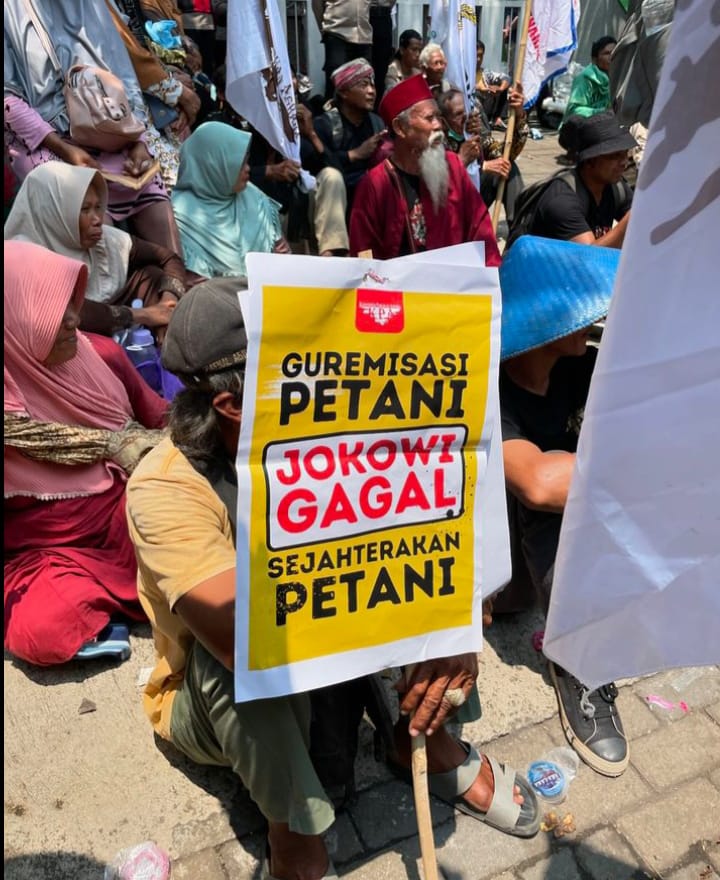The chairperson of Agrarian Reform Consortium (Konsorsium Pembaruan Agraria or KPA), Dewi Kartika says during a public discussion organised by KPA and broadcasted live at IG lIve @TanahuntukRakyat that she urged the State since 1994 to implement a National political agenda - land reform – because there is agrarian issues that is structural in nature where the agrarian political system in is becoming liberal. Dewi urges all parties to understand the agrarian issue, not just about land issue, but land as dignity for peasants.
In 2021, KPA issues Catahu that contains information about national-scale land eviction. It is proven that the Strategic National Program is manipulative and goes on its own. There are many reports from the field, about eviction and land grabbing against peasants and indigenous communities, village communities using Strategic National Program. Initially, the Strategic National Program took over 11 villages in Majalengka for the construction of Kertajati internasional Airport that required 5,000 hectares of land, which is now stalling.
So there is no doubt that the Strategic National Program is an agrarian conflict. Yet, it is often labeled as normal land dispute - re. compensation. It is not, because it is so systematic that it involves the Agrarian and Spatial Minister/National Agrarian Bureau Head, and the security officials to speed up the process. Hence, Strategic National Program is in fact national take-over of people’s land, a take-over of people’s livelihood through legal means, and funded by investment money. "There are people backing the program, so it is a structural and systematic agrarian conflict with widespread social, economic, and political impacts vis-a-vis the State. So, it is simply a llie when it is labeled as an ordinary land dispute because it involves mafia, and it is the State versus the people," explains Dewi.
It is so easy for a profit-oriented project to be labeled Strategic National Program. This is the case in Rempang that has stalled for a long time, and then suddenly in 2023 it becomes active again as a Strategic National Program and everyone is involved; it is systemic, structural, paid, involving security officials, district governments, and and decisions by public officials. It is systemic and structural and backed by a large budget and made to appear legitimate legally and politically, and evidently there are the Rights to Use the Land, the Rights to Use the Buildings, and Management Right as well," explains Dewi. She adds that there are multiple rights to land, there are permits for forestry and mining. This must be decided from policy above. Hence, agrarian conflict is beyond legal issues, because it is legal-agrarian politics.
KPA notes that by 2023, there are 2,939 agrarian conflicts in Indonesia over more than 6.3 million hectares of land and it happens on a daily basis. So what is needed is to strengthen the communities in order to sow the capacity for resistance. Repression and terrors shape communities in such a way and in the last ten years of Jokowi regime the repression and terrors increase compared to the previous SBY government.
The Strategic National Program, based on data obtained by KPA for 2023, only totals 23 infrastructure project. The Strategic National Program is truly a means of nation-wide land evictions. Field data in July based on Presidential Regulation in 2016 suggests that there are 134 Strategic National Program that create agrarian conflicts – Community vis-à-vis the State and Community vis-a-vis State Para-Statal Corporation.
What is Strategic National Program? Is it true what the minister says that the Strategic National Program opens many job opportunities? What happens is that communities do not know anything about it and suddenly they are informed "you no longer need to work in your land, you become security staff at airports, build guest houses, you will not lose your livelihood," so it sound not like an eviction. Think about the indigenous and marginal communities and villages, they would not look forward to go to court to get their compensation.
There is an argument that the Strategic National Program already employs 1.9 million people. Compare this number to the number of landless peasants, which is 2.1 million, and think about the argument about job creation. In Southeast Sulawesi, the Strategic National Project uses overseas workers. In the same year, there are 250 thousand female workers that cannot be absorbed by the Strategic National Program.
The way Jokowi government created the National Strategic Program; by establishing committee to speed up priority infrastructure procurement. He would name that as Strategic National Program and in time the Strategic National Program become easier to establish. Now it is enough to do it through the Coordinating Minister’s regulation. This is powerful and creates many information distortion that the Strategic National Program is sped up and the budget is sufficient. He also adds the budget on an annual basis. For example, Rembang suddenly becomes a Strategic National Program. "This is systematically done by the State by labeling program into Strategic National Program, " says Dewi.
Land procureent no longer uses the usual means but by unilaterally decided with the courts, the district administrators and the village chiefs being involved.
Communities can do nothing when decision about a Strategic National Program is officially made. In the past, Indonesia had law for land procurement. People who objected were able to file a complaint and the government reviewed their complaint, but with the current Job Creation Law, there is no bargaining and no more feasibility study such as what happened in the case in Wadas.
"The Strategic National Program is manipulative but made to look legally legitimate. So, organisational consolidation is needed when we still have to fight against the Job Creation Act, " says Dewi. (Ast)












